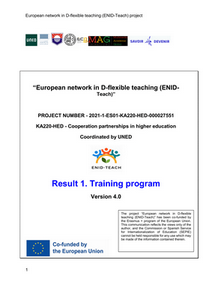Result 1
Training Programme on digital skills in Flexible and Innovative Methodologies
Training Programme on digital skills in Flexible and Innovative Methodologies: A microlearning programme in digital training in flexible and innovative pedagogies, which will consist of five multilingual NOOC (NANO Open, Massive and Online Course) (English, French, Italian, Portuguese, and Spanish).
This result is coordinated by Savoir*Devenir (France)
Needs
It answers the need to develop online skills training of teachers in flexible digital teaching practices. In addition, search for reinforce to harness the resilience of university institutions to different pedagogical scenarios and facilitate educational access to disadvantaged groups. Another objective is to create added value for the Erasmus+ programme by offering an online skills training programme in innovative, digital and multilingual methodologies.
Output Description
The full online programme in digital teaching practices will be presented by each NOOC. It will be a microlearning programme on digital skills training in flexible and innovative teaching practices formed by five multilingual (Spanish, French, English, Italian and Portuguese) and accessible NOOCs created on the basis of microlessons or learning nuggets following a blended methodology.
The program will be available as an online interactive study guide and PDF document in order to be downloaded for offline study / reading. It would include the following basic dimensions that will later be developed and specified:
- Introduction
- Learning objectives
- Contents
- Tutoring process
- Resources
- Activities
- Evaluation system
Target group: university faculty
Elements of innovation
Firstly, there is no other programme aimed at university teachers for online skills training in digital teaching practices that onboards three variables: a distributed, digital and flexible pedagogical model, with a design based on a microlearning programme, microlessons or nuggets and taught as a NOOC. The programme has three innovative elements:
- It is based on a distributed pedagogical model where critical and social teaching practices converge. Teaching in a context characterised by hyperconnection and a distributed network structure where all parties involved operate as links and are interconnected but none is at the centre of the network. Critical and social teaching lifted from classical studies and repurposed for implementation in times of uncertainty, with digitisation providing the flexibility required to respond to the variability of situations, subjects and cultures.
- Programme type: It is a microlearning programme based on microlessons or learning nuggets in multiple formats on the one hand, and on being taught as a NOOC on the other. These two elements combine in a new way of learning and teaching that is innovative and agile.
- Programme content: It entails a series of pedagogical methodologies, each of which is different but all of which focus on the importance of collaboration and connection. They are all methodologies designed to be delivered in an online and/or blended model.
WORK PLAN: March 2022 to July 2022
- The training proposal (methodological strategies, content, learning objectives, tutoring, interactive technological resources, collaboration activities, evaluation), task distribution and target setting will be defined at the first online meeting.
- Within each partner institution, a contact person responsible for the NOOC and for translating the documents of the remaining NOOCs into their national language will be established.


